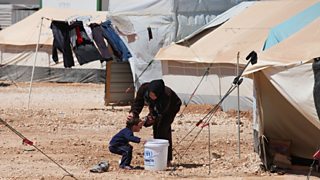
It would be hard to find a place more full of contrasts than Zaatari Refugee Camp in Jordan. This vast lunar landscape is now home to more than a hundred thousand Syrians who've fled the fighting in their own country.
It's a place of safety for sure, but also a place where understandable distress and frustration can quickly take on an ugly hue.
Water is in short supply despite the best efforts of aid agencies from around the world. Heat and dust seem to goad you every step of the way.
Surges in the numbers of people arriving a couple of months ago put even more pressure on the .
Their senior man on the ground here, Killian Kleinschmidt, tells me he drops into people's tents and caravans (really they're nothing more than a container with windows and a door) to listen to their requests and complaints and to involve the refugees themselves in as much of the decision making as possible.
You lose a lot when you become a refugee. First your home, your possessions, then your passport, even your freedom.
The camp has a perimeter fence past which people cannot go. Some of it is topped with barbed wire and there are checkpoints too all around.聽
It looks and feels like a punishment and yet it's a refuge. People arrive every day but others are desperate to leave.
We stopped at the place where hundreds go daily to try to get on a bus back home. Clearly for these people today was the day they'd had enough of being refugees.
Whatever it was that made them flee Syria, Zaatari isn't enough to stop them risking their lives again and those of their children.
We asked the men there if we could speak to them but the atmosphere quickly turned from restlessness to aggression.
"We want out! We want out!" They chanted, banging heavily on our car. They had nothing more to say.
Away from there, the vast stoney ground is dotted with the tiny figures of the children living here.
One boy wearing a scary mask follows us and when he gets close up removes it to reveal a cheeky smiling face. The balm of make believe I suppose.
There are imaginative projects to keep them occupied and to make fun a part of their broken lives. 's public health team at the camp hold painting sessions where each child paints his or her own large tile in bright colours.
They lay it out in the scorching sun to dry then it's used to decorate their communal wash units. It's an opportunity to teach them the importance of sanitation and give them places they care about.
I met a young couple expecting their first child, a group of mothers at a wash block trying to clean clothes (and children) with limited success, and a huddle of men who told me they would return to Syria tomorrow if Britain and others would arm them in their fight against President Assad's forces.
Later, a former fighter in the Free Syrian Army tells me the world has left it too late for that now.聽
Ahmed saw his mother shot dead by a sniper when she went to rescue a child shot seconds before. His handsome, young face tightens at the telling of it and does again when he describes being beaten and stabbed while under arrest by Government forces.
All the while his four tiny children potter in the tiny caravan they all live in, clinging to him from time to time.
Everywhere we go, what little people have is offered anyway. Syrian coffee, sugary tea, juice, water, sweets. Tiny displays of dignity made vital to people who have lost everything.
Farid, a singer, feels like his dignity has gone. "Refugee. It's a small word but it means a lot to me. A refugee is humiliated. Being a refugee is the height of humiliation".
You can listen to 聽present from the Syrian border in Jordan on Tuesday 18 June at 12.00
